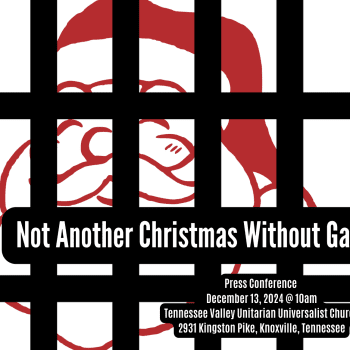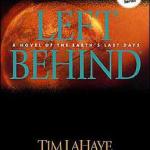At the top of her fame, Roseanne Barr once infamously remarked that she was America’s worst nightmare—she was, “…white trash with money.” I would suggest a similar description, in the arena of Christian faith, applies to Doug Wilson (see here and here): He’s an educated fundamentalist. He’s studied philosophy and is a big proponent of a classical education, but none of that seems to have had any effect upon him.
All that education and deference to the classics amounted to little more than putting lipstick on a pig. Use all the bright red shades one wants, go hog wild, but when you scratch that surface, when you apply some makeup remover, it’s bacon all the way down.
Fundamentalists like Wilson like to accessorize their look. I mean the run-of-the-mill fundamentalist, the one who wears their ignorance proudly, is entertaining for about two seconds. It gets fairly old and boring after that. Dress it up a bit though and throw in some highfalutin philosophy/theology, and many can be fooled. I’m reminded of the old joke about Methodists: They’re just Baptists who can read. Wilson is a fundamentalist who can read.
Those in that camp (the men anyway) imagine if they smoke a cigar, drink a pint of something frothy or a shot of something brown, have a beard, espouse some out-of-bounds beliefs (for fundys) like paedobaptism, and throw some classical literature or philosophy citations around, they’ll fly under the radar. Sorry, no. There are some things an education (or money) or the “right” look can’t buy. In my opinion, Wilson is a fundamentalist in sensibility and bent, no matter how one dresses it up.
Of course, like most fundamentalists, he probably thinks he champions the old ways, the traditional orthodoxy, the old paths and markers. The “old-time religion.” How cute. What he champions isn’t much older than the Enlightenment and mirrors something closer to a Jesus and John Wayne mentality than anything resembling the early church fathers.
A good case in point is evident here. Wilson, like a great deal of, at least educated fundamentalists (and many scientific materialists), champions an epistemology called the correspondence theory of truth. We should also note that although this theory, in a very general sense, has been around a while (some trace it to Aristotle and Plato), it really didn’t come into its own and become the take-for-granted thing that it has been, in the West anyway, until much, much later. In many respects, especially in how it is currently understood and used, it has taken on a modern rationalist/materialist tone. The irony is probably lost on Wilson.
I’ve had conversations with scientific materialists/empiricists that match Wilson’s views here, almost word-for word. Neither they nor the Christian fundamentalist reflect much on the fact that even though both have access to the same reality, the same facts/information, and the same physical/mental faculties (all things being equal), they still manage to arrive at completely different conclusions as to any big philosophical/theological question.
The other is sure if only their opponent had access to a certain piece of information or fact, they would come around. After all, we all apprehend the same reality and exercise the same reason, right? Well, it’s (clearly!) not that simple. Fundamentalists read and interpret reality, the physical world at least, much like they do their Bibles: Literally. And such always entails a certain cursory or surface view of things. Depth, to say the least, is not their strong-suit.
Obviously, there is a general sense in which the correspondence theory of truth is helpful and correct. If the matter is whether or not the sky is blue, the earth round, or the sun a certain distance from the earth, then yes, it’s clearly an accurate theory of truth. The problem comes when it’s applied across the entire board of life/existence to especially abstract or deep philosophical/theological questions. You will notice that Wilson makes no such distinction in his praise of the theory.
Andrew Davison (DPhil, Oxford) points out some of the issues with this theory of truth here. In his chapter of the book, he notes some of the foundational propositions (another problem fundamentalists and scientific materialists share) held by those who favor, whether they realize it or not, this rationalist (the opposite not being irrational, but meaning rather a purely empiricist/materialist) approach to truth:
“The general reliability of sense perception: ‘Our senses correspond to reality as it exists independently of our perceptions.’”
He goes on to point out:
“The Christian might certainly agree that there is something trustworthy about reason and sense. But, again, that is very much a part of a Christian view of rationality, and not something we should yield as a given for every approach to reason. For one thing, the concept of ‘reality’ has all sorts of theological entailments. ‘Reality’ is about as theologically loaded as any term we are likely to encounter…One thing is for certain, that the Christian understands ‘reality’ to transcend sense perception…”
The problem with Wilson’s and many scientific materialists’ favorite epistemology (correspondence) is that it’s a very “thin” view of truth. In general, a Christian view of truth isn’t founded upon a modern, Western, theoretical logic, but upon a person, the person of Christ. Truth is a lived life—not a series of propositions and their correspondence to our perceptions, which are surely limited and finite (I believe St. Paul noted we see through a glass darkly). This isn’t even to mention the matter of perspective and interpretation. The theory leaves out all context, meaning all the factors that shape a person’s perspective and conditions their interpretations of reality to begin with.
Wilson speaks of “veneers” as opposed to white oak in his castigation of those who don’t hold to his preferred theory. The problem is that the correspondence theory isn’t even hardly a veneer, let alone something more substantive like white oak. It’s more a cheap, yellowing, tearing at the edges tacky sort of wallpaper.
Please check out my new book.
I have a Patreon Page—please consider supporting my writing.

















